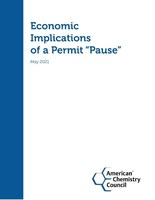Economic Report: "Break Free" Act Could Cripple U.S. Manufacturing, Jobs
Bill Could Risk Up to 910K Jobs and $413 Billion in Economic Output
WASHINGTON, June 8, 2021 /PRNewswire/ -- A new economic analysis finds that the Break Free From Plastic Pollution (BFFPP) Act (S.984, H.R.2238) risks crippling American manufacturing, drastically slashing U.S. jobs and making America dependent on overseas countries for countless essential products, including those needed to combat climate change.
The Report, "Economic Implications of a Permit 'Pause'," measured the anticipated impacts of the BFFPP Act's provision requiring the Environmental Protection Agency to "pause" permitting of production at numerous plastic manufacturing facilities for three to five years, which would result in factory shutdowns. (Similar language is included in Title IX of the proposed CLEAN Future Act). The "pause" also would halt the production of essential chemical building blocks – ethylene and propylene – that support nearly every sector of the U.S. economy.
The economic impacts would be enormous and devastating. The Report found that the "pause" would put at risk as many as 910,000 jobs by 2026 and curtail as much as $413 billion in economic output. (see video).
"While a pause may sound harmless," said Joshua Baca, American Chemistry Council's vice president of plastics, "it would shutdown key manufacturing facilities that support nearly one million jobs, create untold number of essential products and make America's supply chains more resilient.
"The idea of pausing production for five years demonstrates a thorough lack of understanding of how American manufacturing works. Our 'just-in-time' economy relies on an uninterrupted supply chain of essential materials that would be severely disrupted by the pause prescribed in bill. The COVID-19 pandemic recently put our nation on pause – we don't need another even more devastating shock to the economy."
Ostensibly designed to prevent plastic waste, the BFFPP Act would halt production of plastics and other essential materials only in the United States. The Report notes that the production "pause" risks driving U.S. jobs, manufacturing and markets overseas, making the American people and economy significantly more dependent on foreign companies and governments.
According to the report, the lost U.S. jobs and economic output could become permanent, since many closed factories would be unlikely to reopen. Report: "[I]t is unlikely that production would quickly return to 'pre-pause' levels following the end of the 'pause'. In the intervening years, customer industries will have shifted supply chains abroad. As a result, a share of the economic impacts presented in this report, including job losses, could become permanent."
In addition: "The U.S. would go from being a net exporter of plastic resins to a large net importer. This trade impact would make the U.S. dependent on other countries, likely China and those in the Middle East, for a wide range of critical chemicals and plastics including plastics used in medical applications such as syringes, N95 masks, lightweight polymers and composites for fuel efficient vehicles, electric vehicle batteries, solar panels and wind turbines."
The American Chemistry Council urges legislators to scrap the BFFPP Act to prevent seriously disrupting our nation's economy and the loss of American jobs, and to ensure that plastics can continue to play a critical role in manufacturing supply chains.
The Report was researched and created by the Economics and Statistics Department at the American Chemistry Council. Access the Report here.
http://www.americanchemistry.com
The American Chemistry Council (ACC) represents the leading companies engaged in the business of chemistry. ACC members apply the science of chemistry to make innovative products and services that make people's lives better, healthier and safer. ACC is committed to improved environmental, health and safety performance through Responsible Care®; common sense advocacy designed to address major public policy issues; and health and environmental research and product testing. The business of chemistry is a $565 billion enterprise and a key element of the nation's economy. It is among the largest exporters in the nation, accounting for ten percent of all U.S. goods exports. Chemistry companies are among the largest investors in research and development. Safety and security have always been primary concerns of ACC members, and they have intensified their efforts, working closely with government agencies to improve security and to defend against any threat to the nation's critical infrastructure.
SOURCE American Chemistry Council

Related Links
http://www.americanchemistry.com
WANT YOUR COMPANY'S NEWS FEATURED ON PRNEWSWIRE.COM?
Newsrooms &
Influencers
Digital Media
Outlets
Journalists
Opted In





Share this article